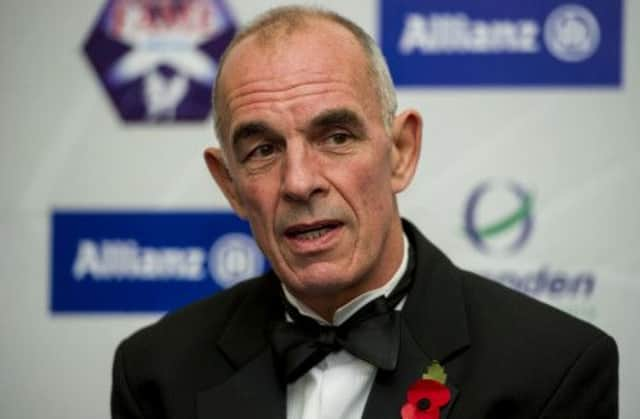Glenn Gibbons: Heroes offer a lesson in humility


An affinity with the game might have prompted the author to add that the difference becomes more pronounced with each passing year.
Those who attended this week’s annual dinner to present and celebrate the latest inductees into the Scottish Football Hall of Fame were made poignantly aware of the distinction between an enriching past and a rather depressing present, encapsulated in a few sentences from Joe Jordan.
Advertisement
Hide AdAdvertisement
Hide AdThe former centre forward was the guest of honour, a relentlessly honest and deeply moving subject for the probing of television presenter Dougie Donnelly, himself a world-class player in the art of the revealing interrogation.
Arriving at that part of his career when he was offered the opportunity to move from Manchester United to Milan, Joe took the breath from his audience when he disclosed that, although he had harboured a yearning to play abroad all of his professional life, he hesitated about going to Italy.
“I was a bit worried,” he said, “that going to Milan could damage my chances of playing for Scotland. So I contacted Jock [Stein, the national team manager in 1981] and he assured me that I wouldn’t be forgotten.”
Jordan, of course, had already played and scored in two World Cups (in West Germany and Argentina) and would go on to complete the hat-trick in Spain the following year. The idea of a present-day Scottish footballer simply moving from Old Trafford to San Siro, far less being concerned that it could cost him caps, is quite preposterous.
But Jordan, astonishingly, was merely echoing the sentiments of the inductees who had been honoured before he went on stage. Tommy Docherty, Eddie Gray, Martin Buchan and Alan Rough were united in their conviction that the most outstanding moment of their long, trophy-laden and wide-ranging careers was when they pulled on the dark blue jersey.
“I never was capped as a youth player,” Jordan expanded. “I played for Lanarkshire Schools, but that was the extent of it. So, to me, playing for Scotland was the absolute pinnacle, no question about that.” The Doc, who could have spent an entirely warranted couple of hours mentally thumbing through a professional life that encompassed 21 clubs and the national team, responded without hesitation when asked to nominate a single outstanding memory: “Playing for Scotland, no question.”
The most striking feature of the unfailingly articulate quartet of Buchan, Docherty, Gray and Jordan was the authentic humility with which they captured the very essence of a team game. Each paid tribute to the exceptional team-mates who made them deeply appreciative of their good fortune.
Their performances reinforced the long-held belief that the largest conceits spring from the smallest talents.
Only time will tell on Butcher
Advertisement
Hide AdAdvertisement
Hide AdGiven Hibernian’s calamitous record in the business of managerial appointments over the past decade or so, Terry Butcher’s readiness to succeed the latest casualty, Pat Fenlon, could be construed as a kind of death wish, a conscious decision to enter an environment in which the incumbent could be said to have the life expectancy of a mayfly.
The big Englishman, however, will be as familiar as anyone in the game with one of football’s most eccentric and enduring truths: that assessing the prospects of success or failure by any acquisition, manager or player, is an impossibility, with no place in logic and with previous form an utter irrelevance.
The sport is saturated with examples of unions whose predicted courses have proved to be bewilderingly unreliable, in the process making fools of those who have been responsible for the recruitment. Supporters frustrated by a series of let-downs almost invariably hurl culpability in the direction of the hirer, in Hibs’ case the chairman and former managing director, Rod Petrie.
But Petrie is no more or less equipped than any other employer, having to make judgements by applying common criteria, such as a candidate’s CV and his impressiveness as an interviewee. None of this can provide an indicator of the indefinable “chemistry” that makes a partnership prosper.
In his recently-published autobiography, Sir Alex Ferguson cites the instance of Massimo Taibi, the highly-rated Italian goalkeeper he believed had the credentials to make a credible replacement for the retired giant, Peter Schmeichel. “Massimo Taibi,” Ferguson writes, “just didn’t work out and he went back to Italy, where he rejuvenated his career.”
Nobody who saw Brian Laudrup in his prime could have imagined that he could be regarded by the fans of any club as a dud, but the great Danish winger was a failure at Fiorentina and Milan, lasting only two miserable seasons in Italy, unable to demonstrate his glittering talent.
Among the most striking cases of that type in Scotland was surely Peter van Vossen, the Dutch forward who looked for most of his two years at Rangers as though he and the ball had never been introduced. Yet he had won the European Cup with Ajax before arriving at Ibrox. On his return to Holland with Feyenoord, he regained his form to such an extent that he was restored to the national team.
Henrik Larsson would become the most outstanding example of the reverse of Van Vossen, the improbable superstar. Considered a third-tier player with Feyenoord and Sweden, Larsson in his seven years at Celtic burgeoned into one of the most brilliant, prolific and influential strikers in Europe at the highest level of both club and international football.
Terry Butcher’s chances of thriving or diving at Easter Road won’t be seen in the tea leaves or the stars. They will, rather, unfold in the fullness of time.